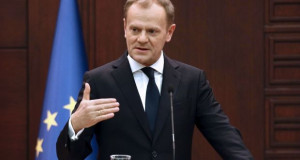The events that have been taking place over the last couple of weeks suggest that Europe will not be able to deal with the massive influx of migrants from the Middle East and Africa in the near future. It would be wrong at best to imagine that such a complicated issue could have been resolved by a simple agreement between the EU and Turkey. The latter according to this agreement was supposed to deal with those displaced souls who left Syria, Iraq and Afghanistan to seek political asylum in the EU. Certain analysts have even voiced their concerns that this migrant flow has been deliberately orchestrated by Ankara to create a profitable business and obtain a way of applying political pressure on European officials.
The prominent French newspaper Le Monde notes that Turkey has no intentions to make changes to its anti-terror laws, even though the agreement with the EU binds it to do so. This position has been voiced on May 6 by Turkey’s President Recep Tayyip Erdogan, who seemed unable to resist the temptation of blackmailing the EU.
Under these circumstances it is not surprising that the German Bild announced that the EU will be seeking for an alternative to the agreement with Turkey, for instance by allocating to Greece a whooping sum of 6 billion euros that previously was promised to Turkey.
Indeed, should Turkey decide to open its border for all those wishing to seek refuge in Europe, Greece would soon be swarmed with migrants. Its islands could be transformed into a transit hub where migrants would be filing asylum applications to the EU, while those who failed to obtain refuge would be safely transported back to the Middle East. This solution could allow the EU to address the most pressing problem of today, while providing Tayyip Erdogan with an adequate answer. The final nail in the coffin of illegal migrant trafficking could be Brussels’ decision to fine Turkey for each migrant who has illegally left Turkey.
It seems that after Merkel’s and Obama’s continuous and fruitless attempts to deal with thi migrant crisis by striking a deal with Erdogan, various EU politicians are starting to wake up to the fact that complicated matters cannot be solved by simply paying ransom.
In the face of the migration crisis, Europeans showed their impotence and insecurity, fear for their own safety, doubts about their ability to integrate migrants, noted the President of the European Council, Donald Tusk, in his article for the French Le Figaro. It’s time for the EU to establish its own migration policy, one in which its member states would decide who, when and how they cross the borders of the Union, said Donald Tusk. Nobody will protect the borders of the EU better than the Europeans themselves. It would be ultimately wrong to hand over the keys of European security to some third country. European impotence encourages external forces to apply pressure on it, while the stakes remain high to allow this situation to carry on further.
In this context, Tusk stresses, against the background of its recent interactions with Turkey, Europe must set clear boundaries of possible concessions it would be willing to make. You can bargain over sums of money, but never over European values. As Europe can not impose its rule over the world, others shouldn’t try to impose their rule over Europe. European freedoms, including the freedom of expression, should not be the subject of political concessions. Donald Tusk underlined that it’s about the time Tayyip Erdogan understands that.
So in the nearest future we will be able to witness if there’s any resolution left within Europe, or words would remain words and the decisions will be made in Washington, not Brussels.
Martin Berger is a freelance journalist and geopolitical analyst, exclusively for the online magazine “New Eastern Outlook”

